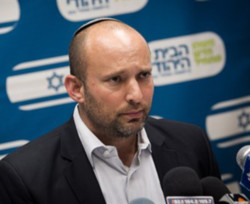
The latest release from the Yale University Press Jewish Lives book series (16 have already been published) is the biography, Hayim Nahman Bialik: Poet of Hebrew, by Avner Holtzman, professor of Hebrew Literature at Tel Aviv University. And why should I assume that readers of this column are interested in reading the life story of a Jewish poet who had lived in the Ukrainian part of the Russian Empire and died in Palestine in 1934 at age 61?
Readers may not be, but I am. I have always been intrigued by the almost mystical affinity between Jews and words, the enduring relationship, in their culture, between text and context. Indeed, so prolific as writers and so astute as thinkers have they been that it is axiomatic among literary critics that without these folks’ contribution to the western intellectual tradition, say between 1830 and 1950 — between Karl Marx and Claude Levi-Strauss, Marcel Proust and J.D. Salinger — that tradition would be much diminished. Emancipated Jews, to use a now-quaint phrase that once described the Jews of Central Europe, knew how to string words together and make them sing, how to use language suffused with an energy of imagination at once sensuous and abstract.
No European language was beyond their reach. Franz Kafka wrote in German, Primo Levi in Italian, Marcel Proust in French, Harold Pinter in English, Vladimir Nabokov in Russian, and Bahshevis Singer, well, he wrote in Yiddish, the vernacular of European Jews. There came a time when you couldn’t explore Euro-American literature, even in a cursory manner, without tripping over the words coined by Jewish intellectuals, theoreticians, poets and novelists. And why not. It’s in their archetype. The intimate, impassioned relationship between word and world in their history harks back to the Old Testament, whose first sentence reads: “In the beginning was the word.”
But then came Zionism, whose leaders grafted their movement on Palestine almost exactly a hundred years ago — bent on establishing there a “national home for the Jewish people”, as the Balfour Declaration had encouraged them to do — and averred that it should be in Hebrew, a moribund language whose springs of life had long since run dry, and not in the borrowed dress of other tongues, that a “national” Jewish identity will emerge and Jewish literature will strike root.
And there’s the rub. Language, as any Freshman majoring in linguistics will tell us, is not just a currency of rational exchange. Language stands in an organic, reciprocal relationship between its speakers and felt-reality. It reflects their sensibility, their consciousness and their inward preoccupations, as it defines their deeply inscribed cultural norms. And never mind that psycho-linguists — getting us mired in the chicken-and-egg circularity — posits the notion that it is culture that provides the environment in which language develops, not the other way round. Whatever. Let’s say that language, culture and consciousness evolve in a close-knit proximity to each other, affecting and being affected by one another.
If you think denizens of a boorish, brutal or totalitarian society will not demonstrate, in their semantic fashions of expression, that boorishness, brutality and totalitarianism, then that Freshman will remind you of what happened to the German language during the frenzies of the Nazi era.
Yes, the resurrection of Hebrew was a miracle, but look at how it has coarsened, becoming the language of the bully, the bigot and the messianic hoodlum. What happens when you turn language on its head and use it to run a hellish occupation, where the occupied are seen as a lesser human species? What happens when you call Palestinian Arabs, as Oveida Yossef, the powerful spiritual rabbi of Shas, for example, called them, “vipers”, “ants”, and “vermin”, unwittingly echoing the very terms used by Nazis to describe Jews (“roaches on dirty walls”)?
Use language to justify what happened in Sabra-Shatila, in Jenin, in Qan’a, in Gaza, and something sinister settles in the marrow of that language — that is, in its speakers’ culture, consciousness and objective reality. Use it to trivialise, or reduce to a fragment, the humanity of the “other”, resorting to terror, violence and coercion in order to subdue him, and your society will be infected with a venom to which it won’t be easy to find an antidote. And when your soldiers march to the “front” — if Gaza and Jenin can be called fronts — so will that language.
Sadly, in Israel today, when Israelis — or many of them, at any rate — listen to the raw, racist rants of the likes of Avigdor Lieberman, Naftali Bennette and Effi Eitan, they give a massive echo to these demagogues’ bellowing, instead of turning away from it in nauseated disbelief. “Language seeks vengeance on those who cripple it”, wrote the literary critic George Steiner in his iconic book, Language and Silence (1958).
From Abraham to Seinfeld and from Sarah to Arendt — that is, from scripture to literature — Jews have enriched the world with their emotive deliberations on, and the deep sense of importance they attributed to, words. Today, as Marx, one of the Jews’ own, would put it: There’s a “puncture in the dialectic”.
True, in the Old Testament, Jews are told that in the beginning was the word, but they are not told what comes at the end — after they have debased it. Israelis would do well to ponder over that.
Fawaz Turki is a journalist, lecturer and author based in Washington. He is the author of The Disinherited: Journal of a Palestinian Exile.










